Max Mirnyi: Wherever I am, I live a Minsk life
A tennis star speaks about his past and shares plans for future
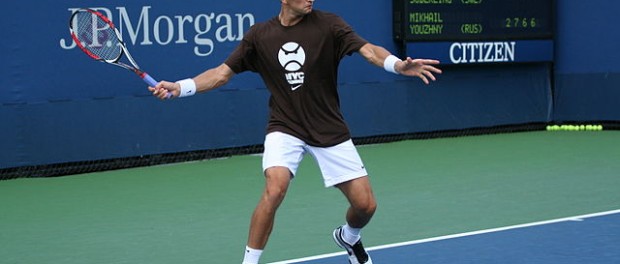
Andrey Vashkevich of Pressball had a talk with Max Mirnyi at the Australian Open this year during which the tennis player recollected the past, spoke on the present and thought of the future.
– Where were you on the 18th of January 2000?
– Well… Let me think… Certainly I was in Melbourne.
– And does the surname Agenor seem familiar to you?
– Yes, I remember him. I defeated that Haitian in 5 sets. I remember the very match, the court we played on. Agenor was a veteran of the tennis world and I was an ATP newcomer. I wanted to win, I was doing my best. As far as I remember it was the first time my father came to Melbourne with me. Earlier I travelled alone. We were trying to save money. It’s not so easy to arrive in Australia. It was very hot (about 35°). Here it’s ok.
– It was your first appearance in singles in Australia. This year you have a 15 year-old anniversary.
– Really? Even earlier I perceived qualification as something highly important. By the way, ATP informed it is my 19th appearance at the Australian Open. Lleyton Hewitt and I are the only tennis players who have such numbers. It was a surprise for me. Because I know that Connors and Rosewall played a lot. Paes and Nestor are older than I am. But it turned out that they missed the tournament some times. One match committed to my memory. I played qualification against Mark Knowles and lost the match. At that time I lived not so far from the stadium in a bead-and-breakfast hostel with an Uzbek tennis player Oleg Ogorodov and we paid 50 Australian dollars. I’m happy that I was able to participate in the tournament so many times. I have a desire to continue working for such great tournaments.
– Did Melbourne Park change a lot from those times?
– I think it’s the best example of good work on the sports infrastructure development. It concerns not only tennis. Such national types of sports as Australian football, rugby and cricket are also being developed. Melbourne can be considered the sports capital of Australia. And I’m not surprised the Grand Slam tournament takes place in this city. I remember when we became witnesses of different economic catastrophes in the world and there was a threat for the tournament. Chinese strived to become new hosts of the Grand Slam. However, despite the economic problems the country and the city managed to save the tournament. We can observe investments made for the Australian Open. Here there are already three stadiums with a roof. Other Grand Slam tournaments do not provide such conditions to tennis players. Moreover, they have other innovations, for instance wi-fi in all the official tournament’s cars. They always try to change something for the better.
– It’s sad to think of the motherland in such a festive atmosphere…
– It’s not correct to compare Belarus and Australia, especially as far as tennis is concerned. Many things are not comparable in these countries, for instance, tennis and financial opportunities. But we made a lot during a 20-year period, during the time Belarus is independent. Our players had wonderful results, starting from Natasha Zvereva and Olga Barabanshchikova, Poutchek and continuing with Vika Azarenka. As for men, Vladimir Voltchkov and I had great achievements. Belarus always has talented young players, best in Europe and in the world. We had a success in the recent Olympic Games, Vika won a bronze medal in singles and we got a golden medal in mixed doubles. Moreover, we had many outstanding victories in Davis Cup. As for infrastructure, we have big changes here. I’d like to see more changes in the regions, but as for Minsk, the progress is evident. Today there are new national objects on Pobediteley Avenue. In Zhudro St. we have a new city centre. And the tennis centre in Serebryanka is getting better. Appeared some private tennis centres, Max Mirnyi tennis centre included.
– I need more details about your tennis centre.
– Our task is to attract Belarusian children to tennis, as many as possible. We have to make this type of sports available for the general publics. We work with schools; we try to destroy the stereotype “tennis is for aristocrats, a child can play tennis only if his parents are ministers or corporations’ owners”. We have another approach: group trainings, combined developing games. By the way, when I started playing tennis my parents didn’t have much money, but I had a possibility to train. So, I became quite a good tennis player at the international level. Now we have more than 300 pupils in the age of 5-10 years. For the three years of our work we brought up national team members (aged 12-14).
-Is it a business project or charity?
– We need to combine these two trends. We are an independent organization. We dispense with state grants. The main task is to make tennis available for everyone. But at the same time we are a private organization, and we have responsibilities towards employees and their families. Our aim is to combine availability and pay-back.
– Do you work at a loss?
– We have worked only 3 years. We have no any credits or debts, but we have no super earnings.
– But again, what about working at a loss?
– We don’t work at a loss. But we develop every month. The club started with 5 employees, then their number became 7, today we had them about 30. Demand increased; as a result we have more tennis and fitness coaches. In general, we work hard.
– Do you experience the happiest period in your life right now?
– I wouldn’t draw the line. I love what I do. If we consider this aspect, yes, I’m happy. Many people who started playing tennis at my time now are in other spheres. So, here I am, at the Australian Open. In the first round we played with my partner on the central court. We played against great opponents and won. Maybe it was my last match on Rod Laver Arena, who knows. Next match was also marvellous. Of course there are some mood changes, but in general I’m satisfied with my life, including professional career and private affairs. My family is ok, my children are healthy, wife and parents understand and support me. That’s all I need.
– Can you say that “Max Mirnyi in ATP” is a business project? Do you work at a loss here?
Of course, if I had no a possibility to participate in such tournaments, I wouldn’t go to Challenge and Future tournaments. There one has more money expenditures and has no emotional nor material feedback as in big tournaments. Everything is connected. Ranking and physical conditions allow me to participate in great tournaments, Australian Open included. This year I don’t win as much as I used earlier, but it’s ok, the life is going on. At the moment I work to have the chance to compete and get pleasure. If I win it’s awesome.
– How do you feel playing with Feliciano (Lopez)?
– We’ve known each other long time ago. He’s a little bit younger, but we competed many times against each other in singles. He was a dangerous player, and we played in doubles too. I like his manner of playing. One can’t defeat him without taking efforts. Feliciano decided to pay a greater attention to doubles. And last year, somewhere in March his coach offered me to play together with Lopez. I was obliged with Mikhail Yuzhny. But while Misha had injures, we decided to play with Feliciano. Our first tournament took place in Acapulco, Mexico and we managed to become finalists. Then we decided to try one more time some day. Finally we played great in Beijing and in some other tournaments. In singles Feliciano uses the scheme “serving+coming to the net”, and it’s so familiar to doubles matches. So he has no difficulties in playing singles and then again doubles. The Spaniard likes playing doubles and he uses it as his preparation for singles.
– Boris Tasman (a Belarusian sports journalist) said you had unlocked your potential at 150%. Do you agree?
– I agree, Boris should know better :). It was hard to finish my career in singles in 2009. Up to that time I have achieved much. And then I said to myself: that’s all. It was a week before the Australian Open. I was ranked 117th and I decided to play if someone withdrew. No one withdrew. And from physiological point of view I was prepared for doubles. I was sure to be unable to play physically singles and doubles at the same time. I have been thinking about that from 2007… My father supported me and helped to compose my calendar in the right way. At that time my main goal was to qualify for the Olympic Games in Beijing. After I achieved my goal I said: “I did everything I could. My next match in doubles will be a plus for me”. So, I left singles and was concentrated on doubles. At that time I was in Top-10. From that time I started adding those 50% (as Boris said). My family is growing up and I should pay attention to my centre in Minsk. When I was a boy and played to be the first in the school, I couldn’t imagine I would have such a career. What is more important, I get pleasure from my active tennis life that consists of getting up, training, sparring, competing. I believe it’s an instinct. When I play against players aged 20, I don’t think about my own age. My only thought is to win. Sometimes it’s so hard to find the right way to win and sometimes I think of giving up. But then I find the way I needed and shake my opponent’s hand having won the match point. It’s awesome.
– Your golden medal in London was part of a big plan, right? When did you realize that Max+Vika had great chances in the Olympics?
– Initially I didn’t think of any chances. Then ITF announced it would add mixed doubles in the Olympic program (it was in July, 2010). At that time I had a bad period in my career. 2009 was not great, and I got out of Top-10 for the first time during a long period. The same question appeared: should I continue my career? And suddenly my father tells me about mixed doubles in the Olympic program. It was the only push to change the future plans. Vika had a success and I recollected our victory at US Open in 2007. I felt I had a chance to come back to the tennis elite. I had no doubts about Vika’s progress. She’s always determined to win. The Olympics should be only in two years. In two years we could expect any thing: injuries, bad playing conditions, etc. So, I couldn’t say it was a big plan. I postponed the future project and continued striving to be among the leaders. Fortunately, I had success. With Daniel Nestor I won twice Roland Garros, the finals and we led ATP doubles. It was significant for me. The time flew. Came 2012. I was the first in the ranking, Vika played great, it was evident we would get a high seed in the Olympics. Such opportunities are not a common thing. Then we experienced a magic.
– From outside it seems you and Vika are so different. Is it hard to understand each other?
– We don’t need to have the same psychological state to achieve a high result. Sport is very unpredictable. A combination of a choleric and a melancholic may be successful. It’s scientifically proved. The thing we have in common is that we hate losing matches. At-a-glance we react differently to the situation. But our aspiration to win makes us to work with zeal.
We lost one set in the final, in semis and quarters… It was hard (except the first round). But something moved us forward.
– Why did you start your matches badly?
– Possibly it was due to Vika’s pressure in singles. Moreover, grass courts are special. If you aren’t concentrated for a moment you can lose your serving game. I don’t know why everything was as it was. Maybe for us it was a must to find ourselves in a harsh situation to play the best. Anyway, I didn’t lose the thought we could win. We believed and fought till the very end.
– There’s a myth that famous and successful sportsmen are so far from ordinary people. What do you think about it?
– Oh, I don’t know. It depends. For instance, Sampras and Federer are legends with a great number of records. Sampras was always closed, he didn’t want to talk to people and journalists, and we know little about his life. And Roger is different: the more he wins, the simpler he is. He’s open, considering his uniqueness.
– What’s the exchange rate now?
– I’m not so far from people. Wherever I am, I live a Minsk life. I know the latest news. As for the exchange rate, I don’t know… Dollar started growing again. Something about 14910 rubles.
– Excellent!
– There’s nothing strange about it. In my viewpoint, every person follows their motherland’s news. I connect my life and the life of my family with Belarus. I want to understand who we are in this complicated world. So, I’m aware of what happens in Belarus. I believe it can demonstrate my “national spirit”.
– You know the latest news, the current exchange rate.
– The truth is that we are proud, small and independent country that has to follow the news and react to the economic and financial development in the world whether we want it or don’t.
– Where do you plan to live after your retiring?
– I’ve always lived in Minsk and I plan to live there after finishing my career. It’s difficult to say how much time I’ll spend in Belarus. The tennis world requires many trips. Recently I’ve started staying in Florida (when it’s winter in Belarus) to be prepared for Australia’s hot weather. I’m accustomed to that. I have my own order of play. After US Open (in September) I play in Asia, then in Europe (Paris, Valencia, Basel). Between them I come to Minsk. When the season ends I think of the next one. And I pay a greater attention to preparations for Australia. That’s why I don’t go to Minsk in November, because I know I won’t be able to prepare in such weather conditions. When I retire I hope I will be able to spend more time in Belarus.
– Where would you like your children to study?
– They study at the international school “Montessori”. They study in Minsk and in Florida, by turns. When it’s cold, they go to the USA. When the tournament in Miami finishes we move to Minsk (in April) and they continue studying in Belarus. Montessori differs from our traditional schools. First of all, it allows having individual schedules, and it’s great for us right now. Everything goes okay. My eldest daughter is in form 4. My youngest daughter only started studying at the same school. Teachers in both countries are tolerant.
– And what about Demid and Trofim?
– Demid is in the preschool grade in Montessori and Trofim is too small.
– Do your children mix languages?
– The lessons are in English in the USA and in Russian in Belarus. Moreover, in America they study Spanish and in Belarus – Belarusian. My wife helps them a lot with the Belarusian language. She knows it perfectly. At home we speak only Russian. My and my wife’s parents help with children. Thanks to various fairy tales, movies, songs and just talks our children speak fluently the Russian language. Of course they need some time to accustom to the life in Minsk, but it’s ok.
-What is more difficult: to be present at your wife childbirth or to defeat Safin in five sets?
– Oh, it’s hard to answer… From life/death point of view to be present at childbirth is very emotional and more difficult than any tennis match. There’s an understanding that a child is inside a woman and one wants everything to be ok. It’s a highly emotional moment! As for physical conditions when I watch the recorded matches against Safin or other tennis player, I can’t believe it was me. At that time we played with Safin during 4 hours and 20 minutes. It was unbelievable!
– Is there any match you can watch again and again? Maybe you show it to your daughters.
– We have a kind of a match collection. I don’t watch matches on purpose, although I should do it. But my matches are broadcast on TV in the sport centre and sometimes I see some details. I understand it’s important for centre’s visitors. These match recordings are my soul, my life, my career with an array of victories and failures. I’m always ready to share my experience and information with anyone who is interested in my matches or tournaments, I’m willing to speak on my adventures in different countries and cities, I’m ready to give advice. In particular I watch modern legends’ matches. And I think: what if Federer played against McEnroe? I adore watching some matches of the 60s or 70s in Youtube.
– I have a question, maybe a silly one, but I’m anxious about getting an answer. Well, a tennis player serves and then turns to a ball boy to get other balls, and a boy gives him some balls among which a player chooses. And this choice takes quite a long time. So, why does it happen and for what reasons he makes one or another choice?
– Everything depends on the player’s style of playing. He has a particular plan for the next rally. For instance, if Ferrer or Nadal does it they will choose a harder ball to start a long rally. Their opponents will have difficulties in playing actively. As for me, I prefer a new and dry ball to play a shot rally approaching to the net.
– Wow! Who would have thought of it?
– Yes, it’s an insignificant thing but if you play two or three hours and you have a certain strategy it’s important. Every 7-9 games the balls are changed. They are in play during different periods of time. Their physical features change and they really differ. Furthermore during the process of choosing a ball you think of the opponent, whether he’s right- or left handed, you recollect how he played the last point, game or set having the same score, you plan to serve fast or slowly, you think how to rotate the ball, whether wind and sun influence. You should make the right decision in 20 minutes and regain the pulse.
– Fantastic!
– Yes, it’s tennis. Every match is an internal monologue. A tennis player always talks to himself. It takes much time, the whole match! We do the same during trainings…
Text and pictures by Pressball.by

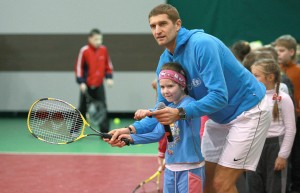
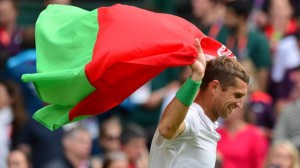
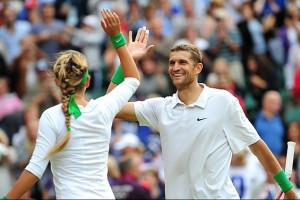
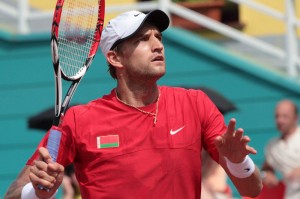
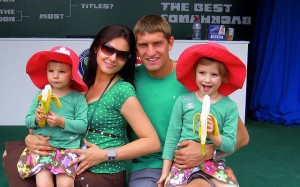
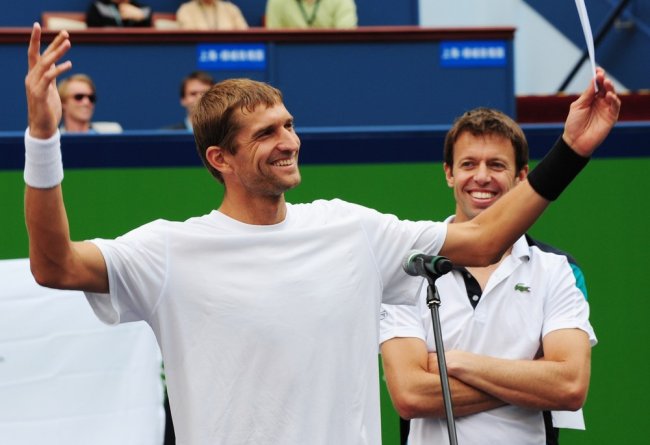





Leave a comment